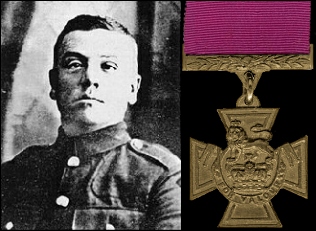Remembrance Sunday – the story of Private Walter Mills
Date published: 10 November 2017

Private Walter Mills was posthumously awarded the Victoria Cross
History has a greater pull on our conscious when we discover a personal link to the past. It could be a distant ancestor, rediscovered by research into our family past. Or perhaps they shared our name, or the name of a close family member alive today says Jim McMahon MP.
Or maybe that link is just knowing that someone involved in one of history’s most seminal events was from your town; once walked the same pavement as you; went to the same school; maybe once drank in the same local pub.
As we look ahead to Remembrance Sunday this week it is important to recall the stories behind the poppies we wear and the wreaths that are placed on war memorials up and down the country. Discovering a local connection to this annual event helps us to remember.
Recently I have been moved by the story of Oldham born Private Walter Mills.
I am moved both by his role in history and because he strikes me as an ordinary Oldhamer. In many ways, his life here probably wasn’t too dissimilar to those of us who live in Oldham today. Though the actions that led to his death were exceptional.
Private Mills fought in the Manchester Regiment during the First World War. On 11th December 1917 he was fighting on the frontline in France at a place known as Red Dragon Crater. Situated close to the town of Givenchy, Red Dragon Crater was formed the previous summer in 1916 when German tunnellers detonated a mine beneath the British positions. 1 year on it would have been a horrific place to fight – like much of the Western front.
The London Gazette[i] printed an account of Private Mill’s actions that day: “When, after an intense gas attack, a strong enemy patrol endeavoured to rush our posts, the garrisons of which had been overcome, and, though badly gassed himself, he met the attack single-handed and continued to throw bombs until the arrival of reinforcements, and remained at his post until the enemy’s attacks had been finally driven off.”
“While being carried away he died from gas poisoning. It was solely due to his exertions, when his only chance of personal safety lay in remaining motionless, that the enemy was defeated and the line retained intact.”
In light of his actions, Private Mills was posthumously awarded the Victoria Cross – the highest distinction for bravery. Private Mills is now buried in France, close to the town where he fought in 1917. His medal was buried with his daughter in the 1930s.
But to mark the 100 year anniversary of his death a stone will be placed in his home town, here in Oldham. It will compliment a blue plaque to Oldham’s Victoria Cross holders, as well as a road in the borough named after Private Mills.
Private Mill’s great-nephew spoke of his pride, and said: “It’s impossible to imagine what Walter went through; what all of the men who fought there went through. We’re just very proud of his actions, and thankful to the local council and Mayor for recognising the centenary of Walter’s death.
“It means a lot to my son too – Walter’s great, great nephew – who went on to become a sergeant in the British Army. Now retired from the Army after 28 years of service, he works for a Christian charity in Salisbury which houses homeless ex-service veterans. He’s a senior support work, who in his own words ‘looks after the lads’. He has no doubt been inspired by the family connection to Private Mills, and his dedication to his comrades in December 1917.”
Most of all, the story of Private Mills moved me because he is representative of something. He represents the hundreds, if not thousands of ordinary working class men from our Oldham towns. They left the Oldham mills and other workplaces in 1914-18, to fight in the First World War. Those who didn’t come back left irreplaceable gaps in families, workplaces and communities across our towns.
Picturing their lives here in Oldham at the start of the 20th century helps us to better appreciate their sacrifices. It also helps us appreciate the sacrifices that soldiers and their families have given in wars since. By doing so, we can avoid the mistakes that led to these wars. Now, more than ever, it is important to remember men like Private Mills.
[i] “No. 30523”. The London Gazette (Supplement). 12 February 1918. p. 2005.
Most Viewed News Stories
- 1Milan Bar in Lees and The Bank at Delph close doors with immediate effect
- 2Punch perfect Kyle is Oldham's latest national boxing champ
- 3Group wanted following attempted robbery incident on a tram in Shaw
- 4Five arrested after two young victims are robbed
- 5Shaw prospect Rafferty aims to shine at massive 'Ring Warriors Unleashed' show




